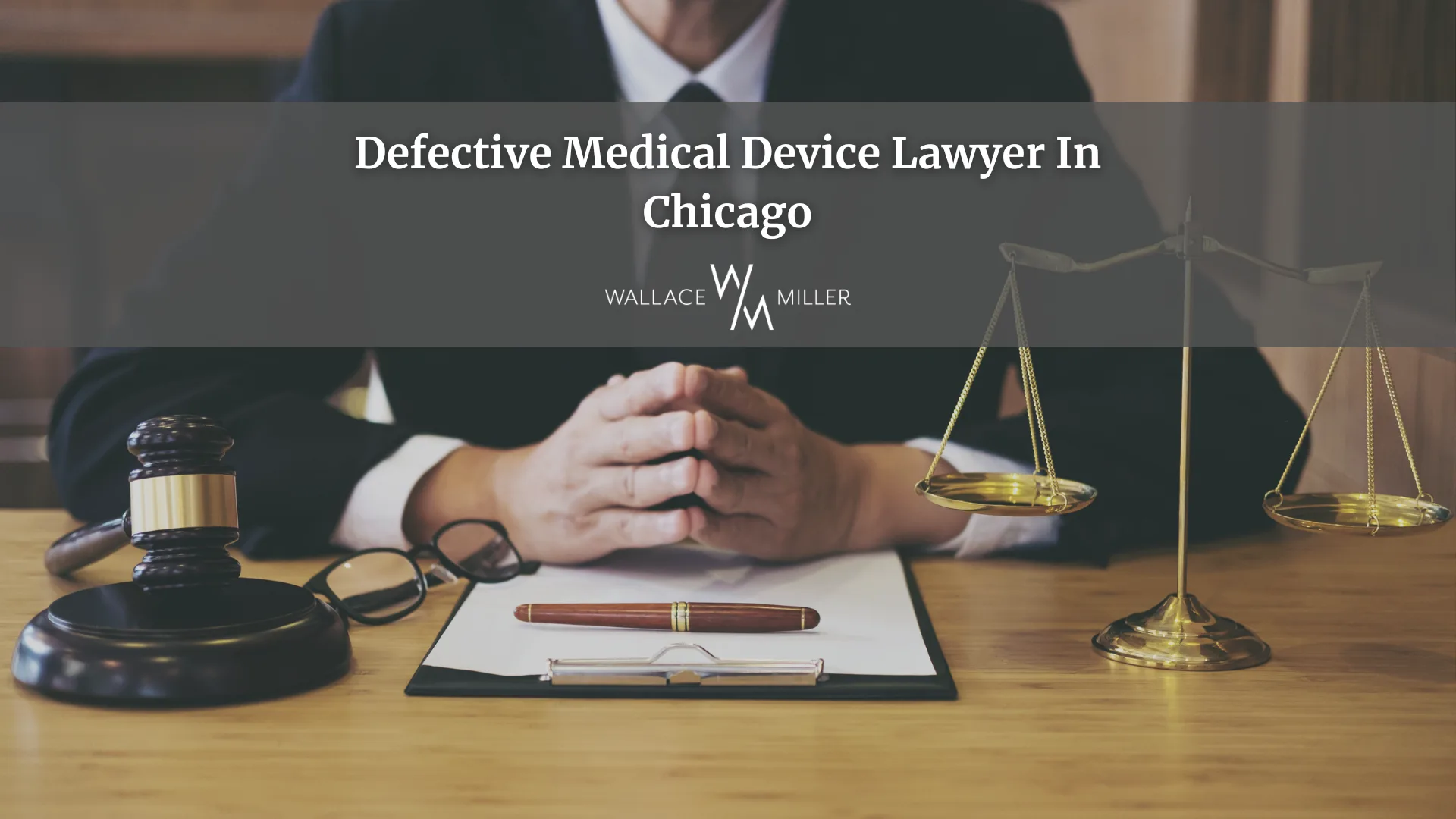
If you sustained an injury from a defective medical device, do not hesitate to contact the product defect and mass tort attorneys of Wallace Miller for legal representation. You might be entitled to compensation from the manufacturer, doctor, or another party responsible for your suffering. We could represent you in an insurance claim or determine whether you’re eligible to join a mass tort lawsuit.
Medical devices can contain defects that cause them to malfunction and injure patients. The manufacturer’s responsibility is to use a safe design and assemble their products according to quality and safety standards. Any error during the manufacturing process can place dangerous medical devices on the market.
At Wallace Miller, our defective medical device lawyers understand the trauma of discovering that a medical device you use doesn’t work as promised. You require additional treatment to heal when you suffer an injury or complications from the defect. It can lead to significant financial strain, especially if you can’t afford your required medical care and related expenses. You might face debt while struggling to pay your bills.
Wallace Miller is ready to represent you and seek the compensation you deserve. We will provide the personalized attention and service you need to get through this challenging time in your life. You can count on our legal team to fight by your side until the end.
Call us at (312) 261-6193 today for your free consultation and learn more about what we can do for you.
Common Types of Defective Medical Devices
Wallace Miller represents clients in various legal matters involving defective medical devices, including:
Penumbra Catheter
Penumbra issued a voluntary recall of its JET 7 Catheters with Xtra Flex Technology on December 15, 2020. According to the U.S. Food and Drug Administration, hundreds of reports cited malfunctions and serious injuries or deaths due to issues with the device, such as:
- Device Expansion
- Ruptures
- Distal Tip Fracture
- Detachment or Fraying of the Distal Tip
- Exposure to Support Coils
These defects could cause injuries and medical conditions, such as:
- Infections
- Air Embolisms
- Hemorrhage
- Kidney Damage
- Blood Clots
- Coma
- Cerebral Infarction
- Anaphylactic Reactions to the Contrast Media
- Radiation Exposure
- Ruptured Arteries
- Brain Damage
- Damage to Blood Vessels
- Leaking Arteries
Exactech recalled its knee and ankle arthroplasty polyethylene inserts after receiving reports of degrading materials. According to the manufacturer, a defect in the non-conforming vacuum bags for the knee, hip, and ankle devices causes components of the devices to degrade. A range of medical problems can result from this issue, such as:
- Bone Loss
- Pain
- Bone Cell Disintegration
- Device Failure
- Corrective Revision Surgery
- Cracked and Fractured Components
- Loosening of the Device
- Accelerated Wear Debris Production
Transvaginal mesh effectively treats pelvic organ prolapse and stress urinary incontinence in women. The device supports the rectum, cervix, and urethra and holds them in place. Unfortunately, manufacturing and design defects can cause problems, such as:
- Pain
- Vaginal Scarring
- Stress Urinary Incontinence or Pelvic Organ Prolapse Recurrence
- Implant Erosion
- Infections
- Urinary Problems
- Bowel, Blood Vessel, or Bladder Perforation
CPAP Machine
On June 30, 2021, Philips Respironics recalled some of its CPAP devices due to degrading foam liners. The wearer can ingest or inhale the toxic chemicals released by the liner as it breaks down and suffer a range of complications, such as:
- Stroke
- Heart Attack
- Organ Damage
- Some Types of Cancer, such as Mesothelioma
- Lung Injuries
- Pulmonary Fibrosis
IVC Filter
Patients with an increased risk of pulmonary embolism have an inferior vena cava (IVC) filter implanted to trap blood clots and prevent them from traveling to the heart or lungs. Packaging and labeling errors led some manufacturers and sellers to recall the device.
According to reports the FDA received, multiple complications can arise after implantation, such as:
- Trouble removing the device due to it adhering to the inferior vena cava
- A clogged device that blocks blood from flowing around it
- Migrating filter causing damage to tissue and the inferior vena cava
- Device fracture leads to tissue damage, organ perforation, and infections
Hernia Mesh
The defects in the hernia mesh prevent it from adhering to the damaged area and providing the necessary support to prevent a hernia recurrence. Injuries and adverse health issues can occur from the defective device, such as:
- Cancer
- Infections
- Device Degradation
- Migrating Device
- Chronic Pain
- Mesh Failure
- Bowel Obstruction
- Hernia Recurrence
- Build-Up of Fluid at the Incision Site
- Organ or Tissue Perforation
- Tissue Adhesion
- Abdominal Pain Due to Nerve Damage
Textured Breast Implants
Breast implant-associated anaplastic large cell lymphoma (BIA-ALCL) is a form of T-cell lymphoma that affects the immune system. It forms in the fluid and scar tissue capsule surrounding the implant. Over time, it can spread throughout the body.
BIA-ALCL can cause a range of symptoms, including:
- Weight Loss
- Breast Enlargement
- Fatigue
- Redness
- Hardening of the Breast
- Changes to the Symmetry or Appearance of the Breast
- Lumps in the Breast or Armpit
- Skin Rash
The manufacturer of Paragard marketed it as quick and easy to remove. However, the arms of the device can fracture during removal and cause internal injuries. Additional complications from the defective device include:
- Device Migration
- Pelvic Inflammatory Disease (PID)
- Uterus or Cervix Perforation
- Infections
- Fractured Pieces Migrating to Other Parts of the Body
- Infertility
If your injury resulted from any of the defective medical devices above or another type of product, contact Wallace Miller to discuss your case. We can review the circumstances and determine whether we can represent you in a case against the manufacturer.
Common Types of Medical Device Defects
Three main types of defects can cause a person’s injury while using a medical device. They include:
- Design Defect – Design defects result from errors during the design, planning, or development stage of a new product. Even if the manufacturer assembles the product according to the appropriate design, the flaw in the design makes the product inherently dangerous to use.
- Manufacturing Defect – A manufacturing defect occurs when a flaw, defect, or error occurs during the manufacturing process. Even though the manufacturer uses a safe design, the product is unsafe despite consumers using it as intended.
- Failure to Warn – The manufacturer is supposed to meet safety and quality standards when manufacturing a product. Any dangers that exist should be on the warning labels, so the user knows about the risks of using the product.
At Wallace Miller, our defective medical device lawyers have the experience to investigate your case and gather the available evidence to prove who was at fault. We can show that the manufacturer should be financially responsible for your injury and resulting medical expenses.
Statute of Limitations for Medical Device Cases
If you want to sue the manufacturer, you must follow a strict timeframe. The timeframe you have to file your lawsuit depends on the state where you live.
Most states have a statute of limitations that designates a timeframe lasting between one and five years. That means you have a specific number of years from the date of your injury to initiate your lawsuit against the at-fault party. Your attorney can review the laws in your state to determine how soon you must file your lawsuit.
If you suffered an injury or complication from a defective medical device, call Wallace Miller at (312) 261-6193 right now for your free consultation with one of our defective medical device lawyers.

Contact Us
Wallace Miller will treat you as a priority and fight hard to try to reach your desired outcome. We take defective medical device cases seriously. You trusted the device to treat your medical condition, provide you a medical benefit, or heal an injury, and instead, it caused more harm than good. You have a right to hold the manufacturer liable and recover the maximum available compensation.

